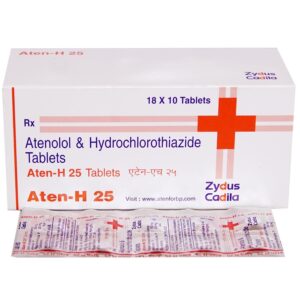ATENOLOL + HYDROCHLOROTHIAZIDE
Atenolol: Atenolol is a drug classified as a beta-blocker. It is primarily used to treat cardiovascular conditions such as high blood pressure (hypertension), angina (chest pain), and certain types of cardiac arrhythmias (irregular heart rhythms).
The mechanism of action of Atenolol involves blocking the beta-adrenergic receptors in the body, particularly the beta-1 receptors found mainly in the heart. By doing so, it reduces the effects of the stress hormones adrenaline and noradrenaline on the heart, causing it to beat more slowly and with less force. This helps to lower blood pressure and reduce the workload on the heart, improving symptoms of conditions such as hypertension and angina.
Atenolol is typically taken orally once a day, with or without food. The usual starting dose for hypertension is 50 mg per day, which can be increased to 100 mg per day based on individual response. For angina and arrhythmias, the dose may vary depending on the severity of the condition and the patient’s response to treatment. It’s important to follow the prescribed dosage as directed by a healthcare professional.
Like any medication, Atenolol may have side effects. Common side effects include fatigue, dizziness, low blood pressure, and slow heart rate. Some individuals may also experience cold extremities, shortness of breath, depression, or gastrointestinal disturbances such as nausea or diarrhea. Additionally, Atenolol can mask the symptoms of low blood sugar levels in diabetic patients. Rare but potentially serious side effects may include severe allergic reactions, wheezing, or worsening of heart failure symptoms.
It is important to note that Atenolol is contraindicated in certain individuals, such as those with a known hypersensitivity to the drug or individuals with certain heart conditions like heart block or heart failure. It is always recommended to consult with a healthcare professional to determine the best treatment options and to discuss any potential drug interactions or contraindications before starting Atenolol.
Hydrochlorothiazide: Hydrochlorothiazide is a medication primarily used to treat high blood pressure (hypertension) and edema or fluid retention. It belongs to a class of drugs known as thiazide diuretics.
The primary mechanism of action of hydrochlorothiazide is the inhibition of sodium and chloride reabsorption in the kidneys. By blocking the reabsorption of these electrolytes, hydrochlorothiazide increases the excretion of water and salts through urine, ultimately leading to decreased blood volume and lower blood pressure.
The typical starting dose of hydrochlorothiazide for hypertension is 12.5 to 25 mg once daily. Depending on the individual’s response, the dose may be increased to a maximum of 50 mg per day. For edema, the dosage may be higher, typically starting at 25 to 100 mg once daily. It is important to follow the recommended dose prescribed by a healthcare professional.
As with any medication, hydrochlorothiazide has potential side effects. Common side effects may include increased urination, dizziness, lightheadedness, headaches, low blood pressure, electrolyte imbalances (such as low potassium levels), and increased blood sugar levels. Less frequently, it can cause allergic reactions, kidney problems, pancreatitis, and changes in blood lipid levels.
It is important to note that certain individuals may be more prone to side effects, such as those with pre-existing kidney or liver conditions, diabetes, or gout. Additionally, hydrochlorothiazide may interact with other medications, so it is crucial to inform your healthcare provider about any other drugs you are taking.
Overall, hydrochlorothiazide is a commonly prescribed medication for hypertension and edema. It effectively helps to lower blood pressure and reduce fluid retention, but it is essential to regularly monitor electrolyte levels and consult with a healthcare professional to manage any potential side effects.

